The Coronation of Poppea
Earthy Elegance
The Coronation of Poppea
by Claudio Monteverdi, libretto by Giovanni Francesco Busenello, translated by Helen Eastman
English Touring Opera at the Hackney Empire until 30th September, then on tour until 14th November
Review by Mark Aspen
Here’s a new idea: build an opera house where the public can pay to go, instead of in some nobleman’s palace. Why not get Claudio Monteverdi, he’s been around for quite a while, to write a new idea in opera, itself another new idea? It is Venice 1642, and seventy-five year old Monteverdi comes up with L’incoronazione di Poppea. It is not about characters from the Bible or Greek myths, or a gentle pastoral idyll, but a gritty real story, based in the court of the Roman Emperor, Nero. Monteverdi had written stage works before, but this was among the first that we would recognise as within the genre of opera as we know it today.
Yet this opera still feels new, even after getting on for four centuries later, astoundingly modern in its approach and refreshing in its honesty. English Touring Opera’s earthy but elegant new production, in English translation as The Coronation of Poppea, is even more so.
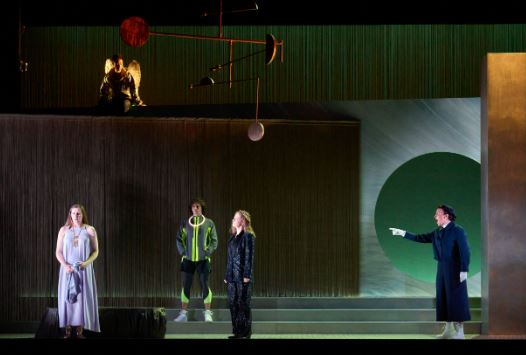
The opera develops as a pseudo-paean to human weaknesses: to lust, power-seeking and overweening ambition. Ironically all these iniquities triumph. Virtue is defeated. The prologue outlines the point of the story, as personifications of Virtue and Fortune cattily debate which has the greater hold over humans, but Love intervenes to say that it is he who has more power than either of them. The libretto’s apparent ultra-cynical realism is, however, put into context by the real-life comeuppance of the underlying historical characters on whom the opera is based. In the harsh court life of the Roman Empire, the historical Poppea was soon kicked to death, in late pregnancy, by Nerone (Nero), who later committed suicide. Otton (Otho), a rival to Nero for Poppea’s affections, later became Emperor for a mere three months before falling on his sword following defeat in battle. Lucano (Lucan), the poet who was favourite of Nero’s, fell foul of Nero and was forced to commit suicide by bleeding himself to death. Generally, it is not a pretty story!
The story as told by Monteverdi and his librettist Busenello, however, wears its sophistry with subtlety, for we are never quite sure of its characters’ motivations. Is it Virtue winning, in Poppea’s declaration of love for Nero amongst Love’s seething sexuality or is Fortune, in Poppea’s scheming ambition to ascend the throne as Empress? Or is Love winning, in Otton’s mixed affections for Poppea against the selfless love of Drusilla, or is Virtue, in his following his conscience when ordered by Ottavia to kill Poppea?
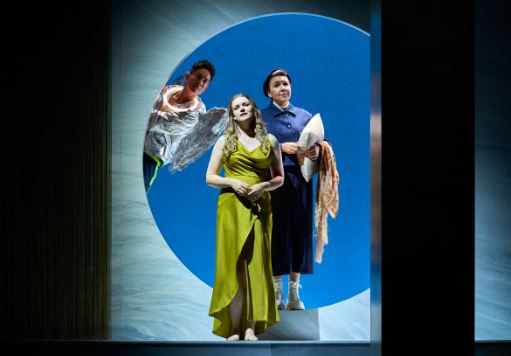
It is this nuanced ambivalence that director, Robin Norton-Hale skilfully rides in her finely realised stylish production. Her The Coronation of Poppea is trimmed back version, where the court events of 58 to 65 AD, which the opera telescopes into little more than a day, mirrors the world of today. Indeed the modern language and ideas seem very 21st Century. In this opera the characters pop out at you, they are credible three-dimensional humans, creatures of their time … and ours.
The translation by Helen Eastman caused a quite an interval buzz on press night, with purists baulking at terms like “pillock”, “knackered”, “pissed-off” or “shagging”. Nevertheless, the vernacular language adds a robust honesty and a directness. It smacks of the language of mediaeval mystery plays. The register though is appropriate to the various situations and to the standing characters: soldiers on guard speak differently to court patricians, and both differently to lovers in the heat of passion. In a programme note, Eastman is unnecessarily defensive in stating that she had aimed to “allow the energy of Monteverdi’s opera to burst through the fourth wall”. Although some of the poetry of the words and much of their integrity with the music are sacrificed, the translation works … just.
Basia Bińkowska’s clean-cut set has a style and precision. Its understated colours, pastel beiges and greys heightened with a soft sheen, form the foil for lighting designer Charlie Morgan Jones to unobtrusively create moods and settings. Two walls of slit drape variously hide or conceal and they focus on a circular entrance, fronted by a sculpture in the style of Sir Anthony Caro. Downstage, a hewn and polished boulder sits like a giant mineralogy specimen. The set may be abstract, but it is permeated with symbolism.
True to the opera’s title, it is Poppea who drives the action of the plot, or rather it is her amoral overarching ambition and the other characters’ reaction to it. Poppea puts the cupid into cupidity, although we are never sure if lust drives ambition or vice versa. Soprano, Jessica Cale, really puts some fire into the role, with a live vocal energy. Her Poppea is a sensual voluptuary, but dissembling and dangerous. Nero, in this opera, is not quite the impulsive Rome-burning megalomaniac of popular history, but a strutting Gauleiter led by lust for his mistress Poppea to be a little shit to his legal wife and Empress, Ottavia. Nero wears a snappy spangly trouser suit and clearly likes a bit of bling. We see his servants taking trays to Poppea laden with gold jewellery and even apples in gold foil and other gilt fruit. Martha Jones portrays the mercurial fervour of Nero with gusto looking over shoulder even when banging Poppea (whoops, sorry, this demotic language is catching). Their sexual encounters are quite steamy or even downright dirty. Jones is a versatile performer fresh from the completely different role as Friday, in Robinson Crusoé, her mezzo-soprano affects an edgy timbre in this role of Nero.
The rightful Empress, Ottavia forcefully defends her position with force (and hints of modern feminism) until events swamp her as she loses her status, her moral high-ground, and finally her dignity. Mezzo Kezia Bienek is compelling as she follows Ottavia’ emotional journey through her indignation at being usurped, to the aborted proxy attempt on her rival’s life, to the anguish of exile. Her velvety tones are superb in the suddenly destitute and shunned Ottavia’s tormented adieus to Rome, her city.
Seneca, elder statesman, philosopher, Nero’s mentor, although being the only protagonist who has not lost his moral compass, treats all the depravity that he observes with resigned detachment. The role is played by Trevor Eliot Bowes with dignified poise, the gravitas in his robust bass lending an air of authority. When condemned by Nero to take his own life, he absolves the Praetorian Guard officer Liberto (Richard Pinkstone, still memorable for a lively Albert Herring), who reluctantly and apologetically brings the order. Seneca’s words “dead and buried” sung at the bottom of Bowes’ register, have echoes of the awaiting grave. The profound act of Seneca’s suicide is a superlative example of a special effect (that would be a spoiler to reveal), both shocking and subtle, with the darkness of the deed symbolised in an unexpected colouring.
The Monteverdian resonance of words, meaning and music is also heard in the “si-si-si-lence”, oh-so sibilantly sung by Amy J Payne as Arnalta, Poppea’s nurse, confidante and eyes-and-ears. Payne really knows how to get the most of the music, witness her mesmerising mezzo lullaby to the sleeping Poppea, or her gloating realisation of her own elevated status when Poppea becomes Empress. The latter is accompanied by a gleeful skipping dance, acting which reveals the character.
Many (love)apple-carts are upset by the interventions of Otton, who pines in lusty-edged love for Poppea, who no longer requites his affections. Otton is portrayed by as hang-dog and rather weedy by countertenor Feargal Mostyn-Williams. It rather begs the question as whether such an irresolute courtier could, just four years later, become ruler of known world, Emperor by military coup, albeit with a Liz Truss like tenure time. Otton’s very ineffectual disguise when forced as Ottavia’s reluctant hit-man to assassinate Poppea, doesn’t come off dramatically. The assassination is unsuccessful and the disguise is in the clothes of Drusilla. This episode exposes a problem with the demotic translation, as laughs come from the audience where they shouldn’t. However, laughs also come where they should, and this opera certainly needs comedy to leaven the violence and the sheer unfairness of the plot.
Elizabeth Karani’s Drusilla is sweetly affecting, and her attractive soprano gifts a gentle feel to the role. But Drusilla is naïve and goes along with the Ottavia-Otton plot, overcoming any scruples simply because she is compulsively infatuated with Otton, and remains faithful to him. He in return attaches himself to her on the rebound from Poppea when she spurns him. His protestations of love for Drusilla seem hollow.
Zahid Siddiqui seems a little uncomfortable in the cross-dressed role of Lucano, the poet who is a bit too close to Nero, although he gets some expansive duets with Jones, as they rejoice in the demise of Seneca. Countertenor Keith Pun and baritone Theo Perry are nimble footed as Love and Mercury respectively. Soprano Julia Mariko plays the hapless Virtue with gusto, while Karani doubles as Fortune to complete the pantheon of gods, goddesses and godettes.
Commissioned to write a new arrangement of Monteverdi’s score, conductor Yshani Perinpanayagam has been very hands on with the development of the production. She has generally trimmed the original and made a few drastic cuts, including some of Drusilla’s best arias. The ETO Orchestra is kept for this production, although more of a size for Cinderella, the other production on the tour. However the other instruments do not swamp the sound of the customary Baroque core. Harp, theorbo and bassoon are comfortingly evident. Overall the sound and pace are as fresh as the on-stage elements.
Monteverdi’s The Coronation of Poppea is a study in irony as its counter-morality and ambiguity enfold. At the opera’s denouement, when we all are open-mouthed and shocked by the victory of vice, Monteverdi has a sumptuous yet delicate duet on love between Nero and his newly-crowned Empress Poppea, exquisitely sung by Jones and Cale.
New and nuanced, startling and sensual are all adjectives that spring to mind for the English Touring Opera’s production. Monteverdi’s fresh approach of 1642, is mirrored by Norton-Hale’s fresh approach of 2023.
O tempora, O mores!
Mark Aspen, September 2023
Photography by Richard Hubert Smith

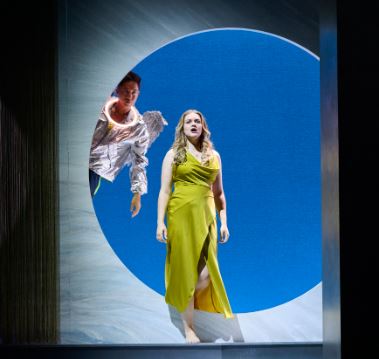
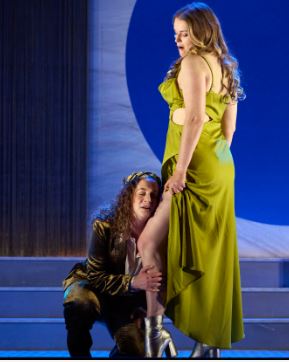
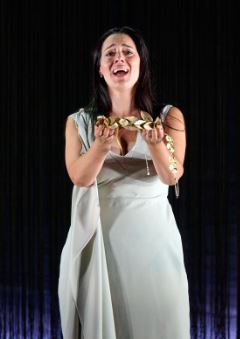
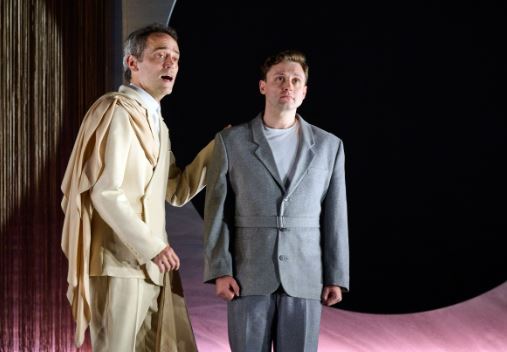
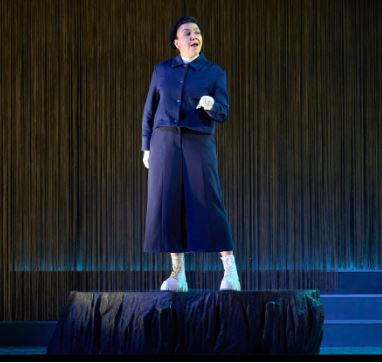
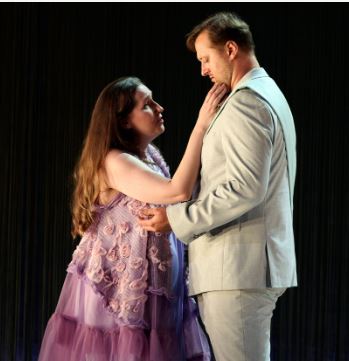
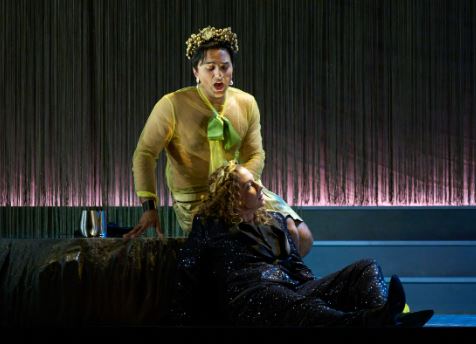
Trackbacks & Pingbacks